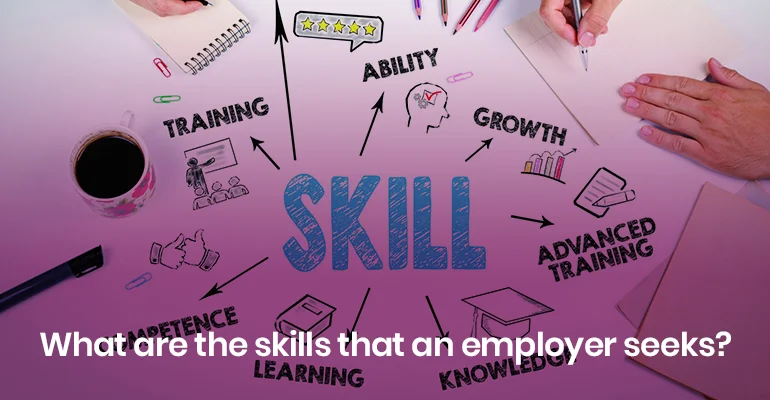Considering the extremely competitive job market, and lack of skilled resources, it is imperative to display the right skills that an employer seeks. Skills do not refer to your academic/technical qualifications or the degrees that you possess. Of course, these degrees define your capability, but skills are finer details that make you employable. Being employable can be defined as “the capability of getting and keeping satisfactory work”. Your employability skills are those transferable skills that ensure employment. It can also be defined as:
“A set of achievements, understandings, and personal attributes that make individuals more likely to gain employment and to be successful in their chosen occupations”. – Mantz Yorke & Peter Knight (HEFCE/DfES ESECT group)
Along with great technical knowledge and understanding, an employer seeks certain qualities in their employees. They trust that such qualities or skills equip the employee to carry out a job role to their best ability. Your employability depends on how you nurture such skills, implement them in your daily activities, and exude in your attitude, during an interview, or at work.
You will gain knowledge from having a degree but it is not sufficient on its own.
A degree does not automatically bring jobs at your doorstep. Although a degree definitely enables you to apply for a job that specifies “must be a graduate”, you need additional skills, abilities, and qualities to stand out of the crowd who applied for the same job and with the same qualifications that you have.
The business environment today is dynamic. The work environment is in a state of constant change. This indicates that your career may require moving between different job functions, maybe even employers. Furthermore, both the job and the employer may change or develop during your period of employment. Therefore, it is only natural for employers to seek enterprising, dynamic, resourceful, and adaptable graduates who can work under such circumstances.
This, however, does not mean that your degree loses its impact. The standard of your degree and your core subject helps you enter the career of your choice. However, it is only your skill set that can help you become employable. The skills you choose to develop must reflect your personality, interests, and your abilities, as these abilities directly influence your career.
On the basis of a number of surveys that were taken by Target Jobs, Microsoft, Prospects, BBC, AGR and NACE, among others, to understand the skills required by graduates have been listed below:
Self-motivation:
You must be able to take an initiative, identify opportunities, and be proactive in offering solutions to problems. You must be able to suggest ideas.
Verbal communication:
Any organisation would want someone who is not only able to speak well, but also express the ideas clearly and confidently by communicating effectively.
Teamwork:
Apart from being able to work independently, you must also be able to work within a group, as a team.
Commercial awareness:
You must be able to identify the commercial realities that affect an organisation.
Problem-solving:
A very important quality that ensures success is the ability to solve problems. If you, instead of simply raising issues, can also offer solutions to it, you will be considered more employable than your counterpart.
Analysing:
An indispensable skill is the ability to analyse. If you are able to systematically gather data in order to establish facts, you will be considered highly employable.
Drive:
Unless you are able to show determination in accomplishing a work at hand, or trying your best to improve the techniques to successfully complete a job in the best way possible, you will not be considered employable.
Flexibility:
You are considered employable if you show flexibility towards the changing work environment or situations.
Written communication:
Apart from the ability to speak well, you must be able to express or communicate effectively in writing.
Planning and organising:
It is always an added advantage to be able to plan activities and stick to the plan. It is a key part of effective management.
Time management:
To be employable, you must be able to prioritise tasks, manage time and work to deadlines.
Although these 11 skills establish employability, there are more skills that are also important based on the job role.
Leadership:
This enables you to direct as well as motivate others
Global skills:
Knowledge of other languages or cultures is a big bonus. It enables an employee to work in countries that do not have English as their official language.
Negotiation:
It is an added advantage if you are able to discuss and convince, as well as negotiate, while reaching an agreement.
Computing skills:
This is a must-have skill in today’s job scenario. Being able to use the word processor, the internet, email, spreadsheets, etc., are considered basic requirements. Understanding graphs, tables, web designing, using databases are an added advantage.
Self-awareness and confidence:
Being confident about yourself can win you a job. Being aware of your weaknesses, strengths, values, abilities and achievements, and coming across as a strong, positive, professional individual earns accolades in any job interview.
Keen learner:
Being able to learn continually and develop new skills and competencies ensures employability.
Stress tolerant:
There are many who quit under high work pressure. Being able to survive high work load, stress, yet maintains performance secures your job and makes you highly employable.
Integrity:
Adhering to procedures, standards, maintaining confidentiality, questioning inappropriate behaviour also adds to your employability.
Decision-making:
You must be able to evaluate logically and factually while presenting solutions to any problem.
Interpersonal skills:
It is extremely important you recognise and respect others views and be open to suggestions and ideas. This skill shows how employable you are.
Creativity:
In a highly dynamic work environment, it is necessary to be creative and applying creativity and solutions as and when necessary.
However, many skills overlap e.g. leadership encompasses planning and organising, verbal communication, decision-making, etc. Verbal communication involves different modes of communication, each easier than the other, such as making a presentation, talking over a phone, or explaining to a colleague without understanding the topic much. However, due to overlapping of skills, you can improve on many skills at once.
We will shortly be introducing a Level 2 Award in Employability Skills to help you find a job. Join our mailing list if you would like to know when it is available.
References
https://www.exeter.ac.uk/ambassadors/HESTEM/resources/General/STEMNET%20Employability%20skills%20guide.pdf
https://www.kent.ac.uk/careers/sk/top-ten-skills.htm
https://www.theguardian.com/money/2013/apr/22/top-10-things-employers-looking-for
https://www.indeed.co.uk/Employability-Skills-jobs
https://www.kent.ac.uk/careers/sk/skillsintro.htm
By an iQualify UK staff writer
1. Achieving Quality
In the classroom, there are children with behavioural, emotional, social or other challenges that may limit their learning abilities. Therefore, when the teacher identifies their weaknesses and applies measures to overcome them, their learners acquire education without any barriers. This ensures that the challenged learners do not feel left out or discriminated from the rest.
2. Developing Talents
The needs in the classroom are not always negative. Learners, especially young ones, are usually undergoing the process of understanding their skills. The teacher, however, is experienced enough to tell that a certain learner has a particular skill or talent. In this case, skills and talents become needs too because they require nurturing to develop. Therefore, once the teacher identifies them and provides the essential support to develop them, they help the learners to discover and grow them.
3. Creating Interest
Identifying and meeting individual learner needs boosts their morale and encourages them. In some cases, the learner does not gain much from mass instruction. As such, when the teacher provides individually prescribed instruction (IPI) it significantly helps many learners to understand and grasp educational concepts. This applies more to subjects such as mathematics and art. If a student feels supported by their tutor, they develop rather than lose interest in learning.
4. Planning Classroom Activities
Once the teacher is familiar with the personal needs of their learners, they can easily plan their day-to-day classroom activities, so they cater to all of them. For instance, the teacher will know how to plan the timetable for counselling, individual tutoring, group interactions and general supervision. In short, each activity targets the needs of specific students such that by the end of the day, every learner’s needs are fully met.
5. Organising the Classroom
The best way for a teacher to organise the classroom is by first identifying the characteristics of each learner. The learners that need more personalised instruction can sit closer to the teacher. If a student has visual difficulties, the teacher can sit him or her closer to the blackboard. They can also sit near a door or window where there is an abundance of light. In a nutshell, the needs of the learners should determine the availability of supplementary material, accessibility of equipment and supplies, as well as the seating arrangements.
Evidently, it is paramount that the teachers identify and meet individual learner needs when teaching. This is because it allows them to devote their energies beyond regular teaching into effective education that is supportive and considerate for each learner. In this way, the students are motivated, supported, empowered, and developed because optimum learning conditions are created.
By an iQualify UK staff writer

